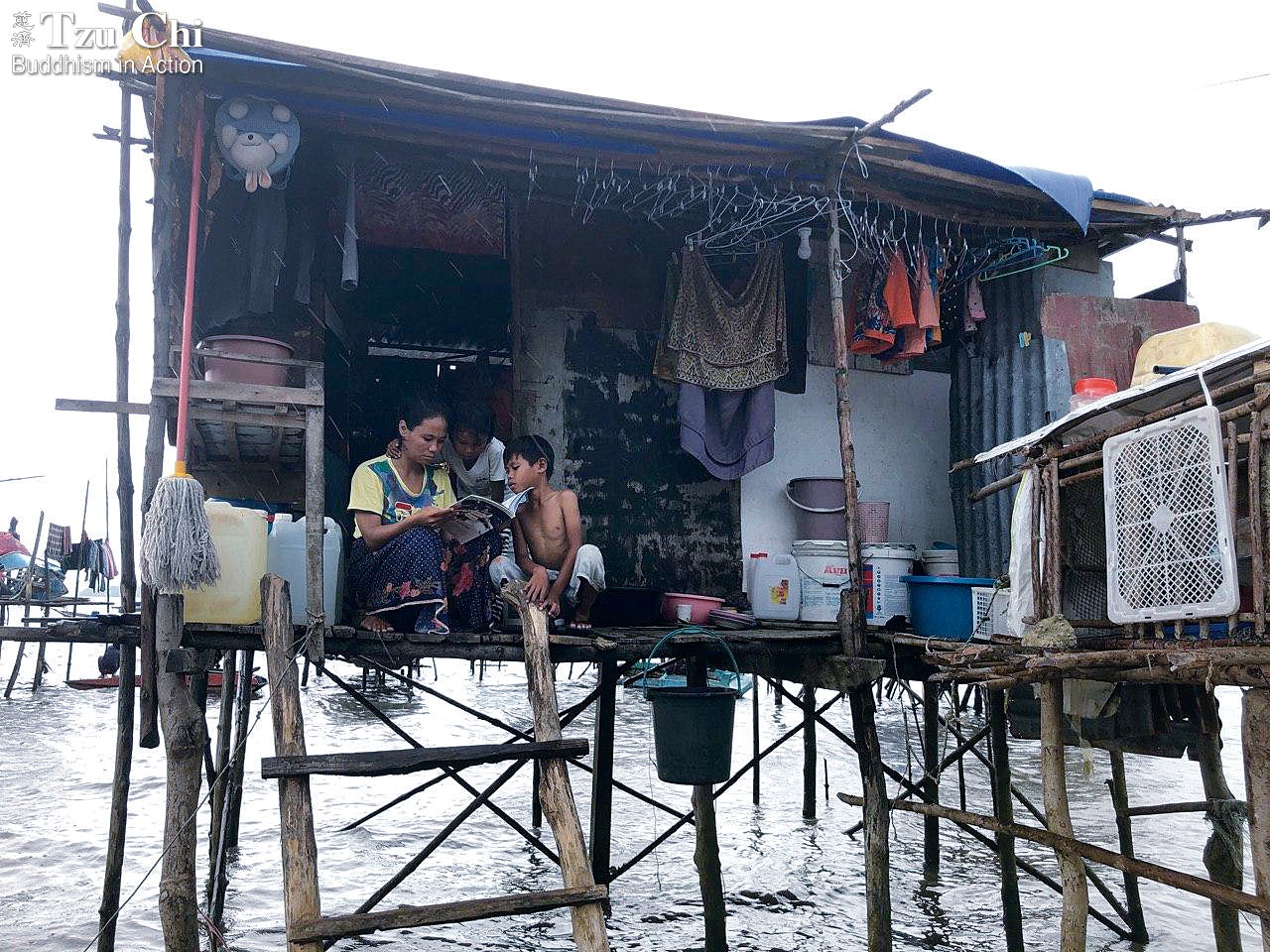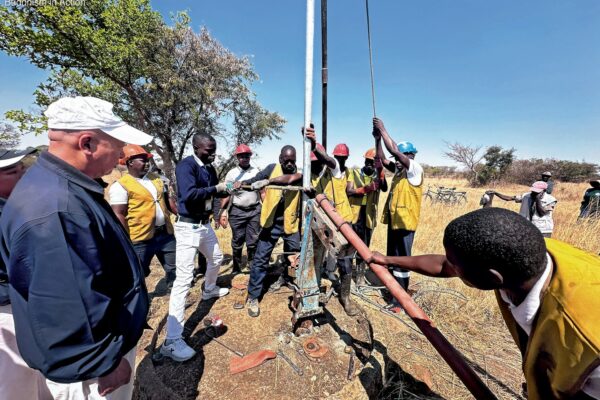Text and photo provided by the Tzu Chi Tawau office
Translated by Wu Hsiao-ting
Tzu Chi helped the Bajau Laut, nomads of the sea, to cope with financial challenges posed by the pandemic.

Villagers in Kampung Panji curiously skim through a copy of Tzu Chi Monthly in a home cobbled together from different materials.
Sabah, a Malaysian state on the island of Borneo, is one of the poorest states in the country. Non-Malaysian citizens account for nearly 30 percent of Sabah’s total population. Many of these non-citizens are descendents of paperless immigrants. Even though they were born and raised entirely in Sabah and consider themselves locals, they have no identity papers to prove who they are. Because they are regarded as “stateless,” they are denied access in Malaysia to education or healthcare. Deprived of these basic rights, many children are doomed to live in poverty.
There are five Tzu Chi offices in Sabah, located in Kota Kinabalu, Sandakan, Tawau, Keningau, and Tenom. After the Movement Control Order instigated to contain the coronavirus was eased, volunteers from these locations began visiting villages where such stateless people live to extend aid to them. The volunteers saw during their visits how the pandemic had made the lives of these underserved people even more difficult. Food was running so low in some households that only salt was left; some children had to stave off their hunger with sugar water.
One of the villages the volunteers visited was Kampung Mangkalinau, which has been branded a “black area” due to its high crime rate. When the police learned that Tzu Chi volunteers were visiting the area to distribute aid, they were worried about their safety. Even the police feared to enter this area. They asked the volunteers, “Aren’t you afraid?”
The volunteers assured the police they were not afraid, and explained they had worked there for some time. They first visited the village a few years before to help administer vaccinations to local stateless children. Since then they have been holding free clinics and promoting recycling there. They even made weekly visits to the region last year to encourage residents to save their spare change in coin banks and donate the money to help needy people. The volunteers hoped to help the residents realize that everyone can help others no matter how poor one is.
Kong Teck Ngie (龔濟晟), a volunteer from Sandakan, said that villagers in Kampung Mangkalinau live in stilt houses erected above the sea. The houses are connected by raised boardwalks. He and other volunteers had crossed boardwalk after boardwalk and visited family after family to enlist more than 300 “coin bank members” from among the residents. Although what the villagers can save and donate isn’t much, Kong and his fellow volunteers are always deeply touched when they receive their donations. The volunteers realize that what matters is not the amount of a donation, but the heart to give.
The pandemic had made it harder for the villagers to make ends meet. Tzu Chi volunteers distributed emergency cash to them to tide them over the crisis. Families with young children also received powdered milk.
News quickly spread that Tzu Chi was helping “stateless villages” through this difficult time. Volunteers’ cell phone numbers were widely disseminated, and every day they received many requests for help. Others visited Tzu Chi offices in person to ask for help. In May alone, Tzu Chi distributed aid to 4,300 families spread across many villages in Sabah. The aid recipients included citizens and non-citizens.
Among the villages receiving Tzu Chi’s aid was Kampung Panji. Most of the residents there are Bajau Laut, also known as “sea gypsies” due to their nomadic life on the sea. They have lived off the sea generation after generation, making a living from fishing. They are among the most marginalized and underprivileged groups in Malaysian society.
Kampung Panji is located behind private property and has no dedicated entrance. People must enter the village by way of a neighboring village or by small boat. Tzu Chi volunteers arranged for three boats to help them transport their goods into the village for a distribution, but that plan hit a snag: it happened to be low tide on the day of the distribution, and the boats they had prepared were rendered useless. The volunteers weren’t easily defeated though. They contacted the owner of the private property and asked for permission to enter Kampung Panji through his property. The owner agreed, understanding that the volunteers were doing their best to help the villagers.
The volunteers heard villagers cheering as soon as the goods were transported into Kampung Panji, but they didn’t realize why the residents were so happy until they entered the village. All the villagers were barefoot. They lived either on small boats or in crude stilt houses cobbled together with worn metal sheets, canvas, and wooden planks. Whether it was in a house or on a boat, entire families were crammed into very narrow spaces. There was no running water or electricity; a wood fire was necessary to cook a meal. All their household items, including pots and pans, were salvaged from discards.
One hundred and sixty-seven families benefited from the distribution. Volunteer Lo Jin Oi (羅珍愛) explained that they had originally planned to give each family 50 kilograms (110 pounds) of rice and ten kilograms (22 pounds) of cooking oil, but they learned that some of the families couldn’t take so much food because the floors in their stilt homes or the boats they lived on couldn’t bear so much weight.
Leong Chin Wah (梁菁華), another volunteer, said that the extreme poverty of the villagers made her forget that she was stepping on a beach strewn with trash and seeped in water contaminated with animal and human waste. Every time she took a step, her weight would squeeze contaminated water from the sand, soaking into her shoes and drenching her feet. Despite that, all she could think of was how to put the aid items into the hands of the villagers as quickly as possible so that they could cook the food and eat.
Hunger is nothing new to these destitute people. Volunteers’ hearts went out to them when they witnessed the hardships they faced. They hoped that the food they distributed would warm not only the villagers’ stomachs, but also their hearts.



